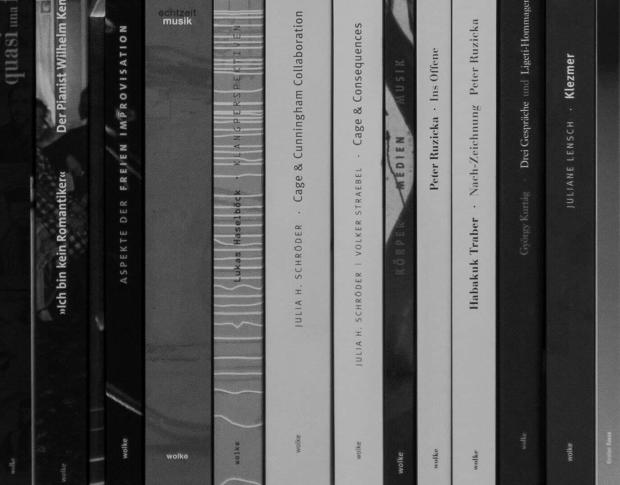Unlimited Editions: Wolke Verlag
August 2022
Robert Barry selects some of his favourite titles from the catalogue of the adventurous German music book publisher
For over 40 years, Wolke Verlag has been an essential source of writing on free music and contemporary composition. Based in Hofheim, a small town near Frankfurt, the publisher was founded in 1980 by a small group of four dedicated jazz fans and continues to be run by one of the quartet to this day, Peter Mischung. In recent years Wolke Verlag has published an account of Peter Brötzmann and Jost Gebers’s freewheeling Free Music Production organisation, a book dedicated to the “ergodic scores of the postwar avant garde”, and a collection of “vocal adventures” by improvising singer Lauren Newton, as well as books about Albert Ayler, Anthony Braxton and Dmitri Shostakovich. Shortly to come will be a collaboration with the Darmstadt International Institute of Music called Black Composers, edited by George Lewis and Harald Kisiedu. The house also maintains close ties with the Darmstadt Jazz Institute. This top five list of publications is a good place to start for anyone who's curious about Wolke's catalogue.
Julia Gerlach (Editor)
Smetak’s Inventions
A perfect example what makes Wolke so special, Smetak’s Inventions is a beautiful-looking book, richly illustrated with photos and original sketches, enclosed in thick hand-stitched hardcovers. Published on the occasion of the first European exhibition dedicated to the Swiss born Brazilian artist at Berlin’s Daadgalerie in 2017, Smetak’s Inventions features a series of fascinating essays by curator Julia Gerlach and composer Marco Scarassatti in both English and German. If your appetite for the weird and wonderful world of Walter Smetak has been whet by the fascinating introduction to his work in Kate Molleson’s recent Sound Within Sound, this volume fully deserves to be the next stop on your journey.
N. Andrew Walsh
Labyrinthus Hic Habitat Musica: Ergodic Scores Of The Postwar Avant-Garde
Walsh goes deep here, from cybernetics to the music of Sarah K Williams, via Yoko Ono, Pauline Oliveros and John Cage’s Variations III. Labyrinthus is an exploration of what the author refers to as ergodic scores – from the Greek ἔργον – that is, “those scores we identify as not possessing the characteristics of a notated score, but which are nevertheless understood as ‘music’”. It’s a dense, scholarly text with pages of analysis and extensive appendices, but it is far from a standard academic textbook. Walsh’s methods here are challenging, at times eccentric, but nonetheless rewarding. This is a book that asks more of its readers than most will be used to – but then so too does its object of study.
Hans-Joachim Braun (Editor)
I Sing The Body Electric: Music And Technology In The 20th Century
Three years before Canadian scholar Jonathan Sterne proposed the need for a new discipline called sound studies, this essay collection anticipated many of the new field’s concerns – as well as offering space to several of its key voices. The book includes Trevor Pinch and Frank Trocco’s “The Social Construction Of The Synthesizer”, Alexander Magoun on the birth of the 45, Karin Dijsterveld on 1920s machine music. Drawing on papers presented at the 23rd Symposium of the Interntional committee for the History of Technology in Budapest in August 1996, I Sing The Body Electric is not only a valuable source of texts on a topic that continues to provoke lively interest, it is also an argument for the value of creative misuse and the “playful, undogmatic use of old ‘objets trouvés’”.
Julia H Schröder & Volker Straebel (Editors)
Cage & Consequences
Another essay collection, this one in two languages, dedicated to one single artist: John Cage. Produced for the composer’s centenary on the occasion of a special symposium for the MaerzMusik festival, Cage & Consequences boasts an impressive line-up of contributors, from Brandon LaBelle to Tomomi Adachi and Bill Dietz. But it’s worth the cover price for the closing panel discussion alone, featuring members of the Sonic Arts Union – Gordon Mumma, Alvin Lucier, David Behrman and Robert Ashley – plus Christian Wolff swapping stories about working with the Merce Cunningham Dance Company. “When I started working with the company in 1966,” Mumma recalls, “each of the composers received 25 dollars for a performance. Everything was equal. There weren’t big chunks of money. It wasn’t the money that was the motivation. It was the energy of the productions and the like. It was just a big nourishment.”
Peter Niklas Wilson
Spirits Rejoice! Albert Ayler And His Message
Despite the vast breadth of his influence, there remains remarkably little in print about the life and music of Albert Ayler. Drawing on influences with Ayler’s father Edward and brother Donald, as well as many of his colleagues and contemporaries (including Amiri Baraka, Milford Graves, Leroy Jenkins and Tony Visconti, among many others), Wilson here seeks to put that right. For many years Spirits Rejoice! existed only in German, but in 2022 Wolke published this elegant and highly readable translation by Jane White. It remains an essential text about one of the most important and singular voices in 20th century jazz.
Read more on Wolke Verlag inside The Wire 463. Wire subscribers can read the article online via the online library.


Leave a comment